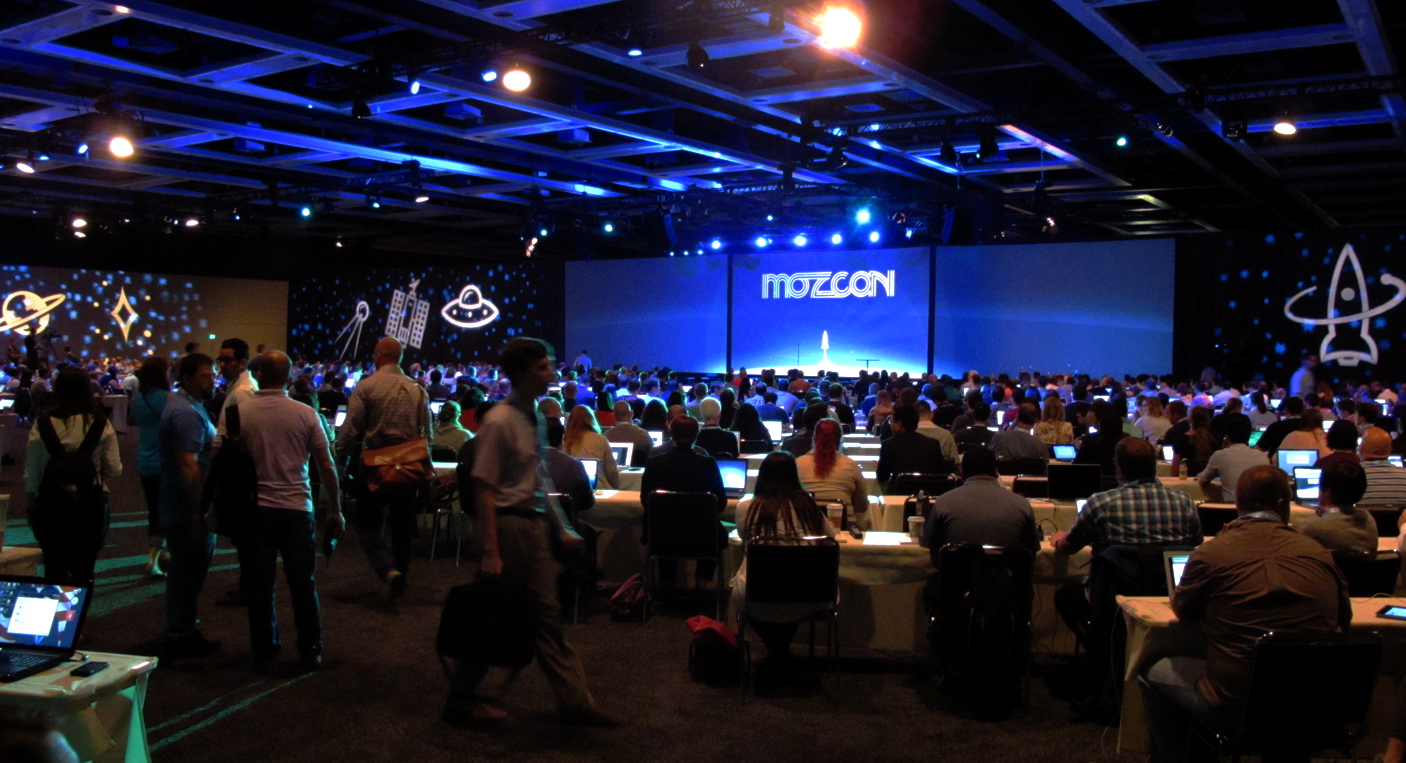Whoa there, partner! This is one old blog post. I wrote this back in 2013. A lot's changed. For one, I no longer speak at conferences.
Don’t let “being too busy” overwhelm you.
Update: okay, okay, I admit this is a bit sensationalized. My scores at Mozcon were relatively strong. The point is still valid, though: by using busyness as an excuse, I didn’t put my best stuff out there. I let myself down, even though the Moz audience was good with it.
Call it hero worship. Call it ideology. Call it youthful enthusiasm from a vibrant, immature industry. A huge amount of self-promotion is at play in digital marketing, an industry I’ve called my own for the past decade. It makes me bristle at times, but this habit of ‘marketers marketing to marketers’ can result in the sharing of great ideas. We are lucky (especially true in SEO) to have a passionate industry. We share our best ideas openly; we share our failings. We share our beer.
I’ve spoken at dozens of conferences. All of the major online marketing shows, and most of the smaller ones. Dreamforce, Mozcon, SearchFest, SMX Advanced, many others. I like challenges. I used to be scared of public speaking. I got over that, only to find the real challenge isn’t standing in full display of a bunch of people. The real challenge is presenting something valuable and worthy of your audience’s time. I want to inspire, entertain, and educate. I want the audience stoked.
But agency life is manic. In a given day I juggle client strategy (and client fires relationships), internal team management, a hectic travel schedule, articles to write, presentations to build, and steady (almost monthly) conferences. And business development. And partnerships. And invention and iteration, innovation and evolution of our internal processes and methodologies. And the regular use of buzzwords and business-speak. The latter is especially exhausting.
When there are lots of demands on my time I don’t prioritize well. It gets harder to manage my days. I’m a poor project manager when under pressure. I get overwhelmed and read Techmeme. I procrastinate. I miss deadlines. I go to Twitter. I don’t prepare. I underachieve.
Overwhelmed and Underwhelming
The biggest stage in SEO (literally and figuratively) is Mozcon. I’ve been invited twice to speak, once at Mozcon 2011 and again last year. Moz puts on a truly original and first rate show. The stage is spectacular (even intimidating), and the speakers are impressive. The vibe is energetic. This is a conference worthy of your finest Powerpoint and roving, peripatetic style. Just seeing that stage made me want to WOW the audience, to surprise and inspire them. Then I nervously fiddled with the thumb drive in my pocket… I knew I’d underprepared. My talk would be mediocre.
Before we go any further, understand my preparation style.
I usually breeze into conferences, waiting for the last minute to build my deck and bringing it with me on a thumb drive to the session where I’m speaking. This is lame. It’s really poor form and unfair to the organizers. They work hard handling a lot of logistics and not hitting deadlines makes their job more difficult. I’ve only learned this by repeatedly being the World’s Most Unprepared Speaker.™
I sometimes build my decks the night before I go on stage, or more harried, two hours beforehand. That means the content flow isn’t well thought out and I haven’t had time to rehearse. I’ve always felt I knew enough that it didn’t matter. I could wing it, talk to a white wall for 30 minutes, and still have plenty of ideas to engage the audience. I no longer feel that’s enough. Presentations aren’t just about what you say, they’re about your presentation. The quality of your decks matter. Mine look like they were built in Windows ’95 with clip art (I’m working on it, with some help from my friends).
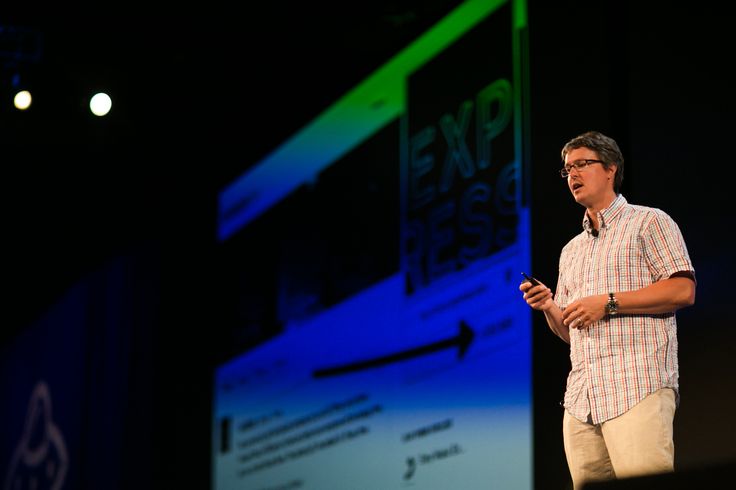
Shows like Mozcon take preparation up another notch. They are active participants in the content of your deck. They want to know exactly what you’re going to cover. They want it fantastic. They give you early access to the stage and let you do sound checks and even a dry run of your deck beforehand.
Of course I chose to do none of these. I was too busy. (Being “too busy” actually means you can’t prioritize.)
Don’t Let Busyness Be An Excuse To Fail
Cue Mozcon ’13. Deck created the day before, mostly incorporating pieces from other talks I’d given. By the time I got on stage and looked out at the audience of my friends, peers, and a thousand faces I’d never seen before, I felt deeply how underwhelming my content was. It wasn’t my best stuff. It wasn’t even a shadow of my best stuff. I had really cool data and client experiences at my fingertips. I had stuff to WOW my audience! And I brought THIS?!
I procrastinated, got overwhelmed with too much to do, and mailed it in. Mozcon was just another todo. I underachieved.
Let’s talk about the scores…
This is my score from 2011’s Mozcon. At the time, I was generally satisfied with this, but knew it could have been much higher if I had prepared more:
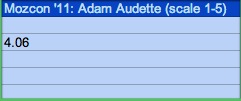
This is my score from 2013’s Mozcon:
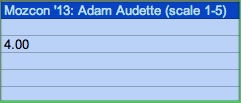
For reference, here was the scale in speaker comparisons:
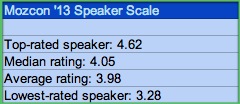
I was below the median rating! And barely above average. Comments from the audience included,
“I deeply esteem Adam and I know him personally, but – maybe because of that – I was waiting for something more from his speech, which IMHO ended up quite basic, as if it was targeting the less educated part of the MozCon audience.”
Truth hurts. And this one,
“Some presentations where quite basic (i.e.: the Audette preso, which I hoped was going to dig more into the technical details)…”
Again, ouch.
Now, some of you will say, “c’mon Adam it’s Mozcon! that show is all hype, it’s more about hero worship and rock stars than quality.” To which I say, phooey. All conferences are generally the same, in terms of the audience expectations from the speaker. The best speakers with the best content (it has to be both) consistently make audiences happy. I want to make audiences happy. Phooey to the Moz hating.
I had underwhelmed myself. I wasn’t surprised it scored low. I knew it could have been so much better.
I was too busy to deliver a great presentation to the crowd. I was too busy to benefit from speaking at Mozcon. I was too busy to participate in the Whiteboard Friday invitation, in the Webinar invitation, in the Moz blog invitation. I was too busy to do my best work and those opportunities fell by the wayside. (Obviously not forever, but that’s not the point.)
See all those too busy opportunities lost?
Being too busy is a shortcoming, not an excuse. It means: I can’t prioritize. I can’t handle having a lot of responsibility. I’m going to slide along and let the easy current float me through, instead of paddling out to the rapids and tackling a bigger challenge. Larger challenges carry rewards that can’t be found in the ripples at the water’s edge.
Don’t be afraid to try your hardest. Don’t be spoiled by easy kills. Go out and kill the biggest game you can find. Make your mark. Try so hard you might fail, try so hard you might feel vulnerable.
What I’m Doing Differently
This experience has made me take a fresh look at my preparation. Here are some of the changes I’ve made. These have already helped improve the quality of my talks. The best part: they can be carried into other aspects of my professional and personal life and help there, too.
- I don’t wait until the last minute to build my deck. Sounds simple, but starting well in advance of my deadline has changed everything.
- I build an outline of my talk before even starting. By doing this, it forces me to get deep into flow and the content of my talk, right away. No winging it.
- I work on the design and ascetic of my slides. No more bulleted lists (at least not as many bulleted lists, I still use them). More visuals.
- I rehearse. Doing this has been the most helpful change of all. It’s really helpful for flow, keeping me on time, and also surfaces new ideas and weak spots (especially when rehearsing in front of someone else).
These are a few things that have helped me. I’d love to hear more ideas.
Epilogue
I’ve included links to both Mozcon decks in the footnotes below. Ironically, my deck from the 2013 show was recently featured on Slideshare’s home page. Maybe I’m too hard on myself.
My feedback wasn’t that bad. My score was above the average (barely). Moz told me, “there’s only a 1.34 point difference between top and lowest-rated speakers.” Well, that’s comforting. But I bet that 1.34 point difference between the top and bottom of the stack rank is what separates the cherised from the ridiculed. It’s logarithmic. It’s huge.
Both of my Mozcon talks did resonate with people. They landed me business.
But that’s not enough.
For me speaking and writing is a means to an end: get out there and better the industry. Spread good ideas to help cover the rubbish that’s strewn so prevalently from industry hacks. Build business. Those are good reasons, but my ultimate raison d’être is for the respect of my industry friends and colleagues. It’s like a kind of self-inflicted peer pressure to not suck in the eyes of my colleagues. In this profession all we have to trade on is our smarts.
So I’m gonna work on sucking less the next time I’m on stage.
Footnotes
- Here’s the Mozcon ’11 announcement: moz.com/blog/announcing-mozcon-2011
- Adam Sherk has a great breakdown of Mozcon ’13 presentations in his usual style: www.adamsherk.com/seo/random-observations-about-mozcon-speakers/
- The Busy Trap: opinionator.blogs.nytimes.com/2012/06/30/the-busy-trap
- My Mozcon ’11 deck, How to Rank Product Pages for SEO: www.slideshare.net/audette/how-to-rank-products-pages-for-seo-mozcon-seattle-2011
- My Mozcon ’13 deck, The State of Ecommerce SEO: www.slideshare.net/audette/seo-for-ecommerce-adam-audette
